Most dogs are mad about cheese. But are they really allowed to have cheese? As a treat or even as food? The question provokes a lot of discussions and even seems to divide the canine nation. While some give the tip that dogs are allowed to have cheese, others are unsettled and tell horror stories in which dogs lose their sense of smell or even go blind. But what’s right now? Clearly, dogs are allowed to eat cheese. It doesn’t harm them, they don’t lose their sense of smell and they are guaranteed not to go blind.
The Essentials in Brief

- Cheese doesn’t make dogs sick or harm them;
- If dogs are lactose intolerant, cheese can cause discomfort;
- Dogs can get lactose-free cheese if they cannot tolerate other cheeses;
- Cheese is not suitable as feed, but there is nothing to counteract it as a treat.
Can All Dogs Tolerate Cheese?
Cheese has a bad reputation with many dog owners because cheese is a dairy product. Some cheeses contain lactose. Many dogs cannot tolerate milk sugar. They don’t have the enzyme lactase, which breaks down milk sugar. This lactose intolerance manifests itself in dogs with diarrhea, gas and can go as far as colic-like abdominal pain. Dogs of all ages can be affected. If the dog is lactose intolerant, he must not be given dairy products. This then applies to yogurt, quark, and some types of cheese. However, dogs can certainly get lactose-free products.
Can’t the Dog Get Any Cheese at All?
No, he can get cheese, but only certain types. As a treat, dogs are allowed to get cheese, which most of them accept with enthusiasm. Even lactose-intolerant dogs can get cheese. Hard cheese hardly contains any lactose. The longer the cheese matures, the lower the lactose content in cheese. The lactose is completely broken down by the long ripening process. Soft cheese, on the other hand, does contain a residual amount of lactose. If the dog is sensitive to this, it should not be given any types of cream cheese. This is where most lactose is found. So no dog has to go without cheese if he gets the right types of cheese.
Is Cheese Even Healthy?
If lactose is omitted, the cheese is healthy for the dog. Cheese contains many essential amino acids. The particularly high-quality food contains not only important protein but also minerals such as calcium, potassium, and magnesium. In addition, there are iron, copper, zinc, vitamin A and vitamins of the B group, all of which are important for the body.
What Should Be Considered When Feeding Cheese?
- Dogs shouldn’t be given too much cheese;
- Depending on the type, cheese can contain a lot of fat. Particularly if dogs tend to be overweight, caution is required here;
- Pay attention to the salt content of hard cheese. If it is too high, it is better not to give it to the dog;
- Cheese, cut into small pieces, is a good training treat.
Our Tip
Cheese does not harm dogs in any way. You should only pay attention to the right varieties that are not too rich in fat or salt. For dogs, cheese can also be a real jackpot when training. As a reward, he gets his usual treats and, if he does something particularly well, a cube of cheese. That will increase his motivation tremendously. Most dogs love cheese and will do pretty much anything for it. Why shouldn’t humans take advantage of this in training?

